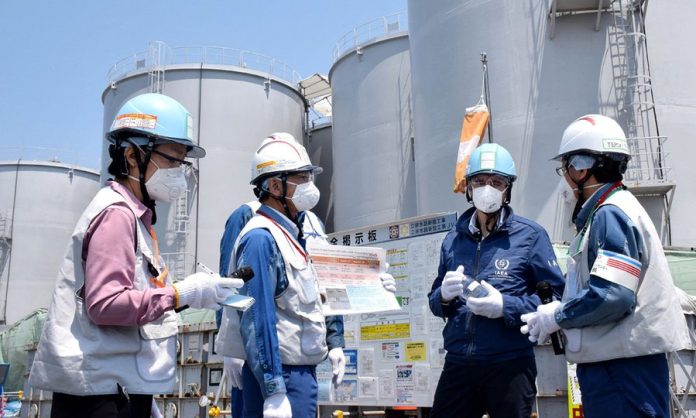Experts have reaffirmed the inevitable radioactive pollution to be caused by the dumping of nuclear-contaminated water from the Fukushima nuclear plant into the Pacific Ocean after Japan last Wednesday initially approved the discharge plan.
They demanded the Japanese government to stop pressuring those opposed to the plan and to truly listen to concerns from domestic public and international community, as a 30-day public comment period will finally determine the fate of the plan.
The Japanese government and Tokyo Electric Power Company (TEPCO) haven’t conducted a comprehensive environmental impact assessment as required by international law, Shaun Burnie, a senior nuclear specialist at Greenpeace, a global environmental protection organisation, told the Global Times.
“Their assessment made fundamental mistakes in radiation protection by ignoring the evidence that many different radionuclides would be discharged from the Fukushima nuclear power plant. For example, how much radioactivity in total is planned to be discharged has not been provided,” Burnie pointed out.
“The contaminated water contains radioactive cesium, strontium, tritium and other radioactive substances, which could be incorporated and concentrated in marine biota and end up in the bodies of humans. Some could cause damage to DNA, while others result in higher risks of diseases such as leukemia and blood cancer,” said Burnie.
“To assess the consequences of the tank releases, we need a full accounting of what isotopes are left in each tank after any secondary treatments. This is not just for the nine isotopes currently reported but for a larger suite of possible contaminants, such as plutonium,” explained Burnie. The expert added that since different radionuclides behave differently in the environment, models of tritium’s rapid dispersion and dilution in the ocean cannot be used to assess the fate of other potential contaminants.
Some isotopes are more readily incorporated into marine biota or seafloor sediment, said Burnie. For example, the biological concentration factor for fish for carbon-14 is up to 50,000 times higher than for tritium. Cobalt-60 is up to 300,000 times more likely to end up associated with seafloor sediment.
Also, the discharge could in reality continue for many decades longer than the period of 30 years claimed by the Japanese government – potentially for the rest of this century and beyond, Burnie noted.
Although the Japanese government and TEPCO agreed in 2015 that the consent of the Fukushima Fishermen’s Association would be a condition for any future discharges, they are trying to pressure those opposed to say yes, said Burnie, encouraging efforts in Japan and the international community to continue to stop the unlawful and unjustified dumping plan.
“I believe the opposition of the Japanese people and international community would work, just like the campaign to stop nuclear dumping from ships into the sea, which took decades of opposition but was finally successful,” said Burnie.
“”The majority of the people in Fukushima, including the fishing, agricultural and forestry industries, remain strongly opposed to discharges. International opposition is also increasingly against the plan, such as from island nations in the Pacific at the Pacific Islands Forum. Their opposition is based on international law, human rights, and the protection of the marine environment and public health,”” Burnie noted.
The Pacific Islands Forum has expressed deep concern about Japan’s decision to dump nuclear-contaminated water from the Fukushima nuclear plant into the sea and urged Japan to rethink about such a decision in April 2021.
Experts said more people should learn about the consequences of the planned release.
“This is about holding a really open dialogue to educate people about the consequences of the planned release,” emphasised David Copplestone, professor of biological and environmental sciences at the University of Stirling.
“It’s really important for the Japanese government to engage in dialogue with those voicing their concerns, and to listen to those concerns,” Copplestone said.
SOURCE: GLOBAL TIMES/PACNEWS













